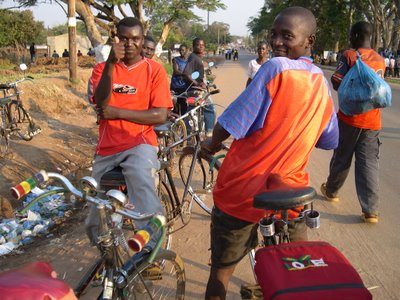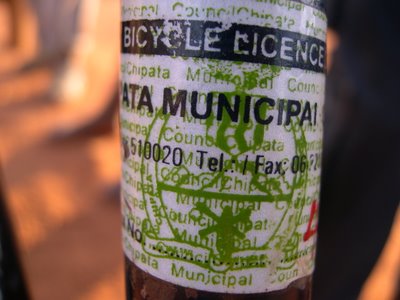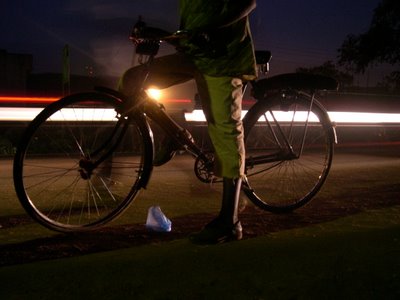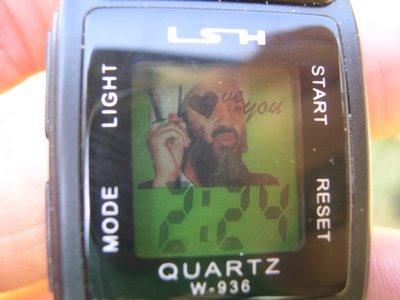1 + 1 = 3 WHY NOT?It is one of those quotes that ends up in self help seminars. You’ve seen it at your local card shop, adorned with rock climbers mid ascent or a long winding road. It reads: it’s not the destination but the journey that matters. I don’t know who originally said it. I have a sneaking suspicion their destination wasn’t that great. Buffalo instead of New York. What I do know, is that the person responsible never took a bus in Zambia.
This past week I spent 10 hours on two buses trying to get from A (Kabwe) to B (Chipata). It was to do research but not of the academic sort. A library didn’t figure into the plans. Nor was a literature review necessary. I was studying the business of bicycle taxis. Lesson one came within the first 10 minutes of the journey. In Zambia it is all about the B.
A bus operator’s manual in Zambia should read:
Find a medium sized bus. Make sure it is imported. Chinese lettering on the side is preferred to indicate its former glory (think bingo halls or the employee shuttle service at Euro Disney). It should look as though it can’t exceed 50 miles per hour. Fill all of the seats. Fold down chairs in the centre aisle. Fill them. Once human cargo is secure add additional luggage. The size of the overhead bin is only a guideline, larger objects like full size suitcases will fit. Having luggage
held is more important than
secured as it capitalizes on the dead space above the passenger’s heads. Add babies. Pre boarding arrangements should be made with all mothers so that one is always wailing while the others breastfeed. Once loaded (difficulty breathing, walls bulging) depress gas pedal fully. Release foot at destination.
To get the loading process right it usually takes 20 minutes to 2 hours. Once completed the effects are immediate. First to go is any notion of personal space. This usually happens as you pass the “Welcome to Kabwe – City of Salvation - Jesus is King” sign. All notions of elbow, arm, foot, leg etiquette are scrapped. Once you’ve resigned yourself to the fact that your seatmate’s body heat will be a part of the trip the physical effects of being compressed in a small space become apparent. By far the worse is the forceful connecting of knees. Both neighbors legs working together to create a lower body vice. With thighs together in a way that males avoid, I find my mind usually drifts during these trips. If not to the frequency in which these buses crash (Zambia Times August 29th 2006: “6 die in mini bus accident”) to the possible physical effects of maintaining a cramped body position for a duration of two hours. I spent the majority of this last trip trying to piece together a 20/20 segment I’d seen years ago. John Stossel’s voice rang clear but I couldn’t come up with the name of the condition people are routinely dying from on long flights from lack of movement. I do remember that one way to avoid it is to take frequent trips down the aisle to the washroom. In this case lack of a washroom, or aisle for that matter, made this impossible. I had to settle for toe wiggles and a couple of sets of neck stretches. The latter giving me the appearance of being fascinated with dry season’s colorless landscape. One redeeming feature is that the medium sized buses are equipped with a tape player. All of my discomfort was appropriately accompanied by Willie Nelson and Kenny Rogers.
Upon arriving in Lusaka you’re dropped at the city bus station where the taxi drivers and bus conductors play a game of rush the clueless white guy. All lobbying to fill their bus/ secure a ride, the scene resembles a camera-less paparazzi. Fearful of permanent damage inflicted in stage one I supersized round two. The greyhound style buses resemble giant moving walls with rearview mirrors that belong in department store change rooms. Like many transport vehicles in Zambia it had been imported and probably failed to meet the requirements of its host country.
The particular bus I rode had been re-branded for the Zambian market. It was now part of the Zoom Bus Lines fleet with “you snooze you loose” written proudly on the back of the bus and all employee uniforms. I struggle to figure out how this might be a selling point. I’m not particular fond of a place that won’t hesitate to leave me waiting in line at the bathroom during a pit stop. Luckily I didn’t have to worry about this. By the time I made my way to the front of the bus for the one and only pit stop the engine revved and started off with the door open. One frantic passenger (a snoozer no doubt) had to make a running leap onto the bus while trying to zipper his fly.
Like trip one, the bulk of my time was spent writing my obituary. This time lack of room was exchanged for doubts in the driver’s coordination. A twenty something droopy eyed character that looked like he should be bumming cigarettes outside Hasty Market. Most concerning was that I never saw him blink. “God is in Control” was written directly behind his seat in giant silver lettering. I found this reassuring as I had no faith in droopy. Apparently I wasn’t the only one. Ten minutes into the trip a gentleman in a suit stood up and led a 5 minute sermon delivered with the same zeal you’d expect at Yonge and Dundas on a Saturday afternoon. Although it wasn’t in English I’d like to think he passed on the collective sentiment that shaving a half an hour off our time wasn’t worth the risk of making headlines.
Appearance aside he also proved to be a brake minimalist. Break neck speed was combined with the recklessness of the high school parking lot at lunch hour: the sense of urgency one finds with a car packed with teens in need of a DQ blizzard. Every corner was handled as though we were on a one way street. Had the road had a centre dividing line it would have run directly beneath the bus for the majority of the trip. The end result was a marathon game of chicken with 60 plus unwilling participants. The row of TV’s stayed blank throughout the trip and no music accompanied the chorus of crying babies so I was left only with the previous trips entertainment. “You were always on my mind” a fitting song to have stuck in my head. Seven hours and one sore neck later we arrived. Chipata, “a lively, friendly place”.
Within minutes of arriving I had found what I was looking for. Bicycles. 1000’s of them. All of which wer

e close relatives of the Humber (The only exceptions were one or two mountain bikes ridden on the lowest gear making the riders legs move ridiculously fast). Most importantly there were bicycles of the carrying kind. Sacks of charcoal. Oil barrels. Slabs of wood configured into an x across the top bar. Ladies with babies wrapped on backs. Men with chickens clutched in hand. Everything and everyone seemed to move with a pair of 28 inch wheels below.
Bus trip forgotten, I jumped at the opportunity to take my first trip. 500 kwacha took me a distance of 1 km from town to the hostel. In addition to the standard “roadster” features this particular ride had a sense of flare which centered on a “more is better philosophy”: Two giant steel bells; Four rearview mirrors sprouting from the handlebar; A homemade cushion to combat bumps; and spokes plastered in a collection of reflectors. The final touch: a mud flap on the rear wheel that read: 1+1=3 WHY NOT?. I had been in Chipata for 10 minutes and already I felt that anything was possible.

For the next three days I immersed myself in bike culture. Although I had all the information in front of me it wasn’t always in the language I needed. This was realized after a good 10 minute conversation with a rider. I ended our chat with the statement that he likely didn’t understand a word of what I was saying, to which he answered with a convincing but clueless “yes”. Attempts at universal sign language also proved inadequate and often resulted in a miming performance in front of a crowd of curious onlookers. Even with the language barrier, however, I was able to piece together what I was looking for: the fees, who is providing and using the service, what works, what doesn’t etc. I spent a considerable amount of time at the “stations” - designated areas where as many as 30 riders waited for customers. And of course over two dozen trips to experience the service first hand.
It was impossible not to close my eyes and picture a similar service taking off in Kabwe. In many ways Kabwe is far more suited for bike culture. The paved roads are still relatively in tact thanks to the glory days of the mines and Kabwe also has an unusually flat landscape. Many of the roads also have a large shoulder on the side which aid in avoiding bike to vehicle mash ups. In contrast, Chipata’s main street breaks into two enormous hills. One of the main markets is situated at the bottom of one hill. Going up requires the strength of Hercules while going down you feel like a Hot Wheel - In place of an orange track is an inconsistent rock strewn road. The roads are also without shoulders forcing the two modes of transportation to share an already skinny route.
Frustrated with my inability to communicate by miming, on day two I decided to move up the ranks and meet some of the movers and shakers in Chipata. First stop police headquarters. At the main desk I inquired who I could speak with and was promptly sent to the traffic offices. They listened to my story but were unable to help explaining that the Commanding Officer was the only person who could assist me. In order to arrange an appointment with the #1 I would first need to speak to the second in command. As though on cue, the top dog walked by at mention of his name, followed by the number two. Three stops and 10 minutes later I’m hanging out with E.L. Mushondwa – Commanding Officer, in his office lounging on his couch like an old friend (with the giant safe only partially obscured by his desk). In exchange for discussing accident rates and bike related issues I told him how Canada was. Although specific numbers were difficult I was assured “bash ups do occur”. Officer Mushondwa seemed supportive of the taxis on all fronts except one. Chipata is a border town with Malawi. In order to avoid border taxes it is quite common to pay a bicycle taxi to take your TV or other high priced item across. This illegal movement of goods and sometimes people is often cited as the catalyst for the bicycle taxis business as it supports a bicycle culture. The term “Boda Boda” is a shortened version for “Border Border” which the riders shout when soliciting customers. Officer Mushondwa also shed some light on Chipata’s bicycle licensing system. Prior to leaving his office I was told I must go to the Municipal Council, the originators and enforcers of the tax. If I wanted the full story I would have to track down the Chief Administrative Officer.
Four offices later (with an average waiting time of under a minute per office) I’m with Mr. Moyo, Chief Administrative Officer discussing bicycle taxi licenses. I would like to attribute it to luck or my ability to smooth talk but it was quite clear: Chipata is home to the world’s quickest bureaucracy. Thanks to a local government act it seems municipal councils were granted permission to raise money on their own accord. In a town full of bicycles what better way to get some extra spending money then to start charging them for owning one. One usually associates a license being preceded by a test where you display a skill level, whether it be parking between two pylons or scraping off plaque without making gums bleed. In Chipata there is no need to display any competence on your bike. Simply dole out 8000 Kwacha (about 2 US) per year and your bicycle is legal for the road and you are a registered bicycle user. Don’t get one, and risk being fined 20 000 Kwacha and an additional 8 000 Kwacha for the license. Between March to July of this year over five thousand tiny stickers had been sold.

Two weeks prior to my visit, Levy made a stop in Chipata. In full campaign mode he announced that bicycle licenses (a money making initiative he encouraged) were being abolished. I’m hoping he’ll forgive me for knocking his lack of issues in my last post. The council didn’t seem too pleased with the announcement. In Mr Moyo’s words “he is a lawyer, he knows how to get away with this stuff”.
The most efficient bureaucracy trend continued for the rest of my stay. Sure some threw out minor obstacles. Luangwa Bicycles Ltd maker of Eagle bicycles wouldn’t give a tour of the factory until the right personnel was present. But once inside I was given full access of the plant and even a souvenir sticker to go home with. The statistics and census office of the local government insisted on a written request for information. As I headed out the door I was handed a blank piece of paper and directed to write as a name and postal code were rhymed off. Next thing I know I am sitting in a room full of staff surrounded by maps of Chipata with the letter I had written minutes ago signed, stamped and sitting in a folder on the table next to us.

The trip’s highlight took place on the third day. Thanks to a giant painted mural I learned that Chipata had its own radio station; 99.6 The Breeze. After the previous days success I figured they might be worth a visit. Because my visa was extended in Chipata as a tourist I had to be careful how I presented myself. Thus Mark West, PhD student from Canada specializing in sustainable transportation was born. Like everywhere else I’d been, the first meeting didn’t sound promising. After the sales pitch the secretary directed my eyes to the advertising/ political message rates. 420 000 Kwacha per half an hour didn’t fit into my budget. Then in classic Chipata fashion, head announcer Memory walked in. She had just returned from the International Aids Conference in Toronto. Memory immediately took to my story. Mr. West was scheduled to hit the airwaves at 7:30am the next morning on Memory’s call in radio show.
As soon as I entered the studio I had to question what I was getting into. The mom and pop operation façade the office presented evaporated as soon as I saw where they recorded. The Breeze housed a full studio with tens of thousands of dollars worth of gear dominating the whole back area. Even more intimidating was hearing the smooth radio friendly voice of Memory cueing the songs prior to our show. Butterflies in high gear I tried to downplay the whole situation. I asked one of the employees, “who listens to The Breeze?” hoping it was a question that could be answered with one hand. His response of “everyone” didn’t help. Nerves aside the show started at 7:30am as planned. Based on the number of callers way more than five people listen to local radio. Callers weighed in on the issues in English and the local dialect, Nyanja. Topics discussed ranged from why females don’t ride bicycles, safety issues with passengers to critical mass rides in Toronto and rickshaws in India. The crowning moment of my radio career came that afternoon long after the show ended when I was recognized by a local from the show. Hoping for some feedback I asked how the show was to which he responded “It was really nice and I wanted to call but I had no talk time”. I’ll take it.

On the way back I couldn’t help but feel excited about the prospects of a bicycle business in Kabwe. Accompanied by R Kelly (tape flipped twice) my thoughts were stuck on making it happen. It hardly seems a difficult task now. If 1+1 = 3. Why not?
I didn’t have an answer.
** Deep-veined thrombosis (DVT) or "economy class syndrome" - a condition frequently caused by long periods spent in cramped conditions. It kills dozens of airline passengers each year.







